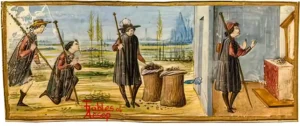A Traveler bargained safe passage with Mercury for half of any findings. He found nuts and dates and ate both leaving pits and shells for Mercury.
Peoples’ actions toward the gods differ from their words.

L’Estrange version
One that was just entring upon a long journey, took up a fancy of putting a trick upon Mercury. He say’d him a short prayer for the bon voyage, with a promise, that the god should go halfe with him in whatever he found. Some body had lost a bag of dates and almonds, it seems, and it was his fortune to find it. He fell to work upon ’em immediately, and when he had eaten up the kernels, and all that was good of them, himself, he lay’d the stones, and the shells upon an altar; and desir’d Mercury to take notice that he had perform’d his vow. For, says he, here are the outsides of the one, and the insides of the other, and there’s the moiety I promis’d ye.
Moral
Men talk as if they believe in God, but they live as if they thought there were none; for their very prayers are mockeries, and their vows and promises are no more then words of course, which they never intended to make good.

Gherardo Image from 1480

Mercurius et Viator
Viator, longum iter ingressus, Mercurio, si quid invenisset, se dimidium oblaturum votis promisit. Cum autem in peram amygdalis dactylisque refertam forte incidisset, eam laetus capit, nummos ibi inesse arbitratus. Sed, ea excussa, nihil aliud quam amygdalas dactylosque adinvenit. Quibus omnibus comesis, amygdalarum cortices et dactylorum nucleos collegit et in ara, quae ibi forte aderat, collocavit, aiens, “Habes, O Mercuri, quod votis promisi; interiora enim et exteriora inventae a me rei obtuli tibi.”
Moral
Fabula avarum respicit, qui ad avaritiae suae cupiditatem explendam Deos quoque decipere conatur.
Perry #178
